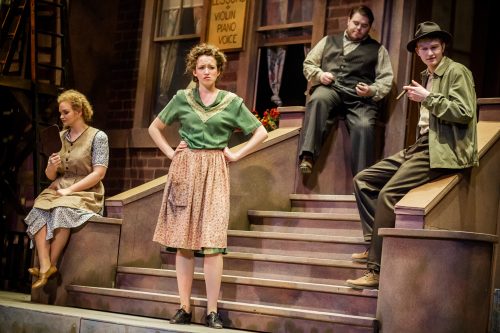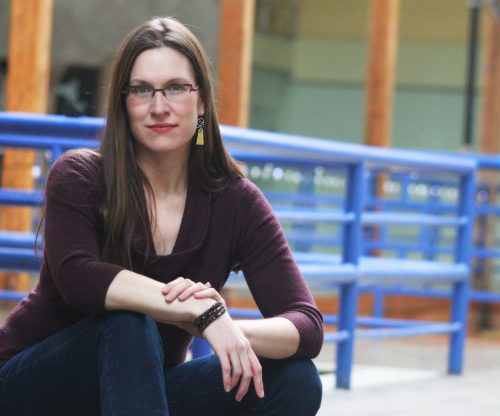by Andrea Schuler, Summer@Eastman Program Coordinator
Lindsay Baker began working with Eastman’s Voice and Opera Department in 2001. She was the Production Stage Manager for Eastman Opera Theatre until 2011; she also taught acting seminars and offered dramatic coaching to voice majors. Lindsay has been an adjunct Instructor of Opera since 2016; she currently teaches the Body Awareness, Movement and Dance and Acting Seminar courses, assists the Advanced Opera Seminar, and continues to offer dramatic coachings.
This summer, Lindsay will share her theatrical knowledge and experience with Summer@Eastman students in two new institutes: Encouraging Ensemble: Integrating Theater into the Music Classroom (a continuing-education course for K-12 music educators, June 28-30) and Acting for Singers (for collegiate and adult performers, July 2-6). We are excited to have her on board! To introduce these new classes, we asked Lindsay a few questions about the importance of theater training for singers and how the institutes came to be:
You’ve had a long and varied career with the Eastman Voice and Opera Department! What do you like most about working with singers?
I enjoy working with singers because of the unique task they have as artists to communicate text through the medium of music. I love helping singers unite two techniques (singing and acting) into one, and then watching them let it all go to become fully present, physical and active in performance.
Do you find that most singers are naturally theatrical (because of the extroverted nature of their art), or can the simultaneous demands of text and vocal technique sometimes make acting a challenge? How can theater training enhance a singer’s performance and stage presence?
Every singer’s inherent theatricality is different, but I find that they all share the desire to move an audience through the beauty of their art. Let’s be honest: singing isn’t easy. It demands an understanding of how to produce healthy sound, make adjustments to create nuanced musical expression in order to convey textual meaning and dramatic intention — all while being fully embodied, in a consciously relaxed state, to make the singing and performance seem effortless.
Theater training adds more tools to the toolkit of a singer’s craft: it allows the singer to get to know the body in new ways and increase the versatility of their instrument, and it provides additional ways to consider the meaning and expression of text and the creation of character. Theater training helps singers to become singing-actors, who use text and music to create playworlds on stage.

“My passion is ensemble and collaboration”: Eastman Opera Theatre’s March 2013 production of Kurt Weill’s Street Scene
As an actor, what do you watch for when singers perform? What distinguishes the best performers and interpretations from the rest?
Specificity. Specificity. Specificity. This is what makes live performance meaningful. Performers who stand out are fully present in the given circumstances of their playworld, actively try to achieve an objective, and do so because they are a unique and developed character.
Talk a bit about your “Encouraging Ensemble: Integrating Theater into the Music Classroom” institute for music educators. What inspired you to create this course? How did you first hit upon the idea that theatrical concepts and techniques could also be beneficial in a general music setting? What will students explore during the institute?
My background is in both vocal/general K-12 music education and theater arts. My passion is ensemble and collaboration, whether in music or in theater-making. Growing up, I primarily experienced what I considered to be true ensemble — united artistic consensus — in my choral experiences. Then I did some advanced training at the O’Neill National Theater Institute, and for the first time I had the same ensemble experience with a group of theater artists. It was through the theater training that I was able to articulate what I experienced in my music-making.
I originally started thinking about how theater training might benefit music educators when I was invited to lead an “Acting for Musicians” workshop for the Sigma Alpha Iota Province Day at Eastman in 2013. I then led a smaller version of the workshop for the music faculty of the Penfield CSD in the spring of 2016. I was subsequently able to practically implement some of the ideas in the classroom when invited to work with two choral ensembles at Penfield High School the following fall. All of these experiences convinced me that there is something to be gained from an interdisciplinary approach to building a dynamic and responsive creative group.
I am very excited for this summer’s “Encouraging Ensemble” institute. Participants will learn a variety of exercises that they can modify and adapt to their own particular classrooms. They will also have an opportunity to try teaching sample lessons to each other. Each session will be an ensemble-building laboratory full of imaginative and creative play.
**
